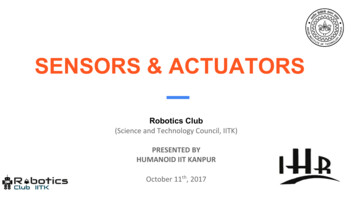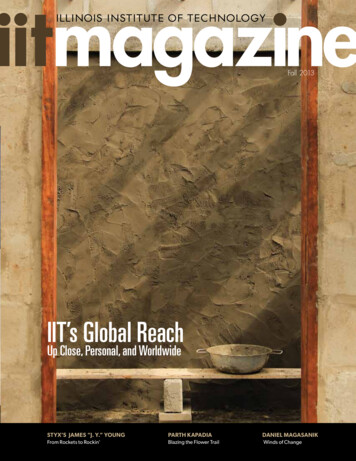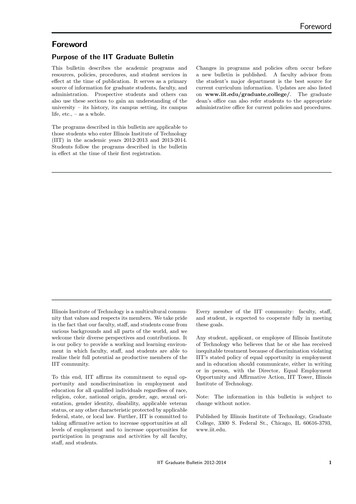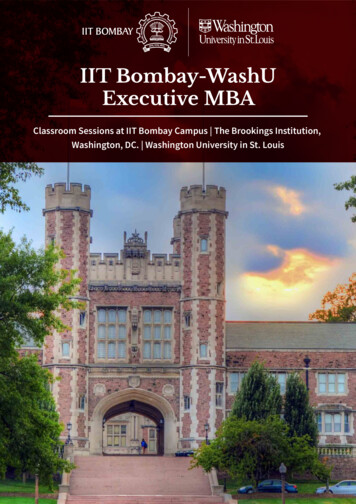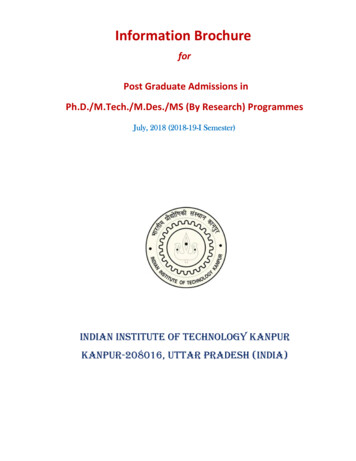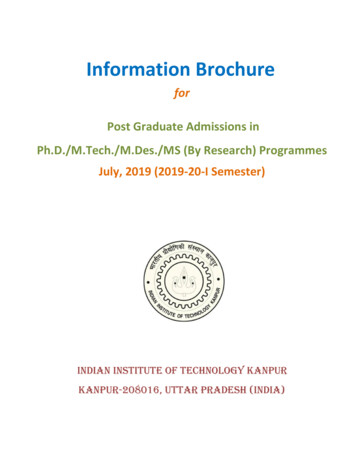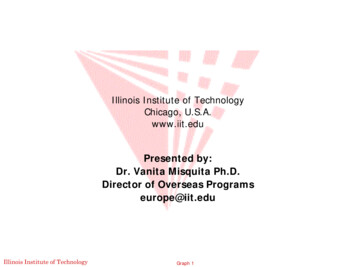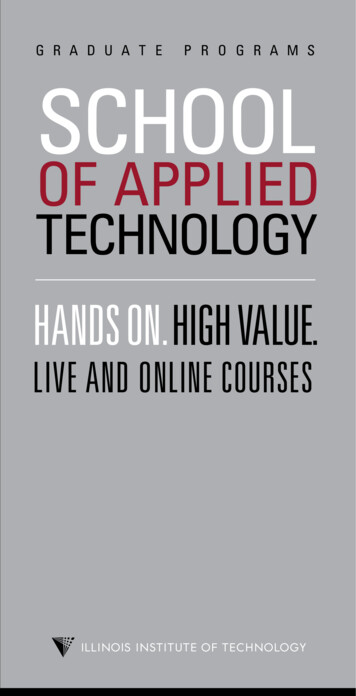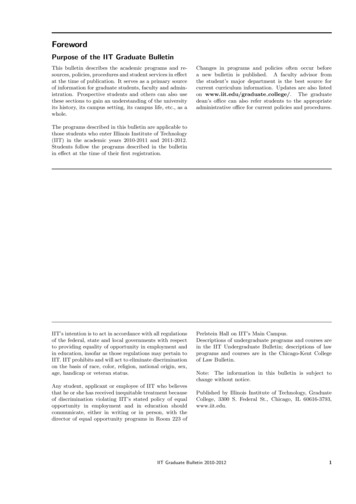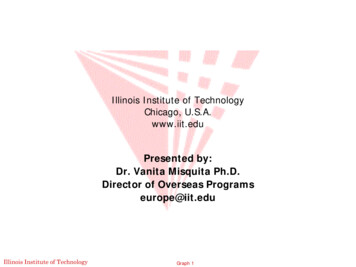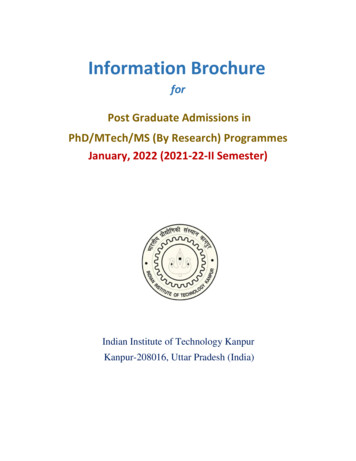
Transcription
Information BrochureforPost Graduate Admissions inPhD/MTech/MS (By Research) ProgrammesJanuary, 2022 (2021-22-II Semester)Indian Institute of Technology KanpurKanpur-208016, Uttar Pradesh (India)
AEROSPACE ENGINEERINGThe Department of Aerospace Engineering offers comprehensive teaching and research programs atundergraduate (UG) and postgraduate (PG) levels leading to B Tech, B Tech-M Tech dual, M Tech, MS(research) and PhD degrees. Currently there are four research groups ((i) Aerodynamics, (ii) Propulsion, (iii)Flight Mechanics, (iv) Structures) and two Interdisciplinary Specializations (IDS) ((v) ComputationalMechanics, (vi) Aero-Thermodynamics and Thermal Sciences, available in the PhD and M Tech programs.Admissions in MS (research) program are available only in the four groups ((i) Aerodynamics, (ii)Propulsion, (iii) Flight Mechanics, (iv) Structures).The Department is actively involved in sponsored R&D and consultancy projects funded by a range ofdefense and civil organizations. Some of them are, Aeronautics R&D Board, DRDO, ISRO, HAL, NAL,ADA, DST, etc.FACULTY MEMBERSA. C. Mandal, PhD (IISc Bangalore):Turbulent Shear flow.Experimental Aerodynamics, Flow instability and transition,A. K. Ghosh, PhD (IITK): Flight Mechanics, Neural Networks, Flight Testing.A. Tewari, PhD (Missouri-Rolla): Flight Mechanics, Aeroservoelasticity, Space Dynamics and Control.A. Kushari, PhD (Georgia Tech.): Propulsion, Combustion, Liquid Atomization, Flow Control.Abhishek, PhD (University of Maryland, College Park): Rotorcraft aeromechanics, futuristic VTOL/STOLsystems, aerial vehicle design, Unmanned Aerial Systems, Inverse flight dynamics and wind turbines.Ajay Vikram Singh, PhD (University of Maryland, College Park): Combustion and Reacting Flows,Combustion Generated Functional Nanoparticles, Soot Formation and Oxidation, Fire Dynamics,
Arnab Samanta , PhD (University of Illinois at Urbana-Champaign):Fluid Mechanics, Aeroacoustics,Hydrodynamic Stability, Flow Control, Wave Motion.Arun Kumar P., PhD (IIT Kanpur): Subsonic and Supersonic jets, Flow control, Jet acoustics.Ashoke De, PhD (LSU): CFD, High Speed Flows, Flow-Acoustics Coupling, Fluid-Structure Interaction,Turbulence Modeling, Multiphase flows and Combustion, Energy Harvesting.C. S. Upadhyay, PhD (Texas A&M): Computational Mechanics, Damage Mechanics.D. P. Mishra, PhD (IISC Bangalore): Combustion, CFD of Chemically Reacting Flows, Propulsion, HeatTransfer. (On leave)Debopam Das, PhD (IISc Bangalore): Theoretical and Experimental Fluid Dynamics, Aeroacoustics,Instability & transition, Vortex Dynamics. Unsteady Aerodynamics, Bird's and Insect's Flight.Dipak K. Giri, PhD (IIT Kharagpur): Spacecraft Dynamics and Control, Space Explorations: On-orbitServicing, Space Debris Removal, Orbital Infrastructure Design in LEO, MEO, GEO.G. M. Kamath, PhD (University of Maryland, College Park): Structural Health Monitoring, CompositeMaterials and Structures, Structural Dynamics, Condition Monitoring, Machine Learning, Aeroelasticity.Kamal Poddar, PhD (UC, San Diego): Aerodynamics, Turbulence, Low and High Speed Flows.Mangal Kothari, PhD (University of Leicester): Optimal Control, Nonlinear and Adaptive Control, FlightVehicle Guidance and Control, State Estimation, Motion Planning and Cooperative Control.Mohammed Ibrahim Sugarno, PhD (IISc Bangalore): Experimental Hypersonic Aerothermodynamics,High Enthalpy Test Facilities, Shock Waves.Navrose, PhD (IIT Kanpur): Fluid Mechanics, Fluid-Structure Interaction, Optimization, Flow Stability andControlPritam Chakraborty, PhD (Ohio State University): Mesoscale mechanics for plasticity, fatigue, creep andfracture; FEM; Multi-scale methods.P. M. Mohite, PhD (IIT Kanpur): Damage Mechanics of Laminated Composites, Composites, FiniteElement Analysis.R. Kitey, PhD (Auburn University): Fracture Mechanics, Composite Materials, Experimental StressAnalysis, Optical Metrology, Thin Films, Finite Element Method.Raghavendra P. Kukillaya, PhD (Princeton University, New Jersey, USA): Aircraft and Airship FlightDynamics and Control, Systems Modelling, Simulation and Design, Optimal Control, Biomechanics.Rajesh Ranjan, PhD (JNCASR Bengaluru): CFD, Turbomachinery Flows, Applied Aerodynamics,Transitional and Turbulent Flows, Stability and Flow Control, HPC.Rakesh Kumar, PhD (Penn State): Hypersonics, Rarefied Gas Dynamics, Microfluidics, MolecularDynamics, Heat Transfer & Thermal Design.Sanjay Mittal, PhD (Minnesota): Unsteady Aerodynamics, CFD, FEM, Low speed Wind-Tunnel Testing,Bluff Body Flows, Shape Optimization, Sports Balls, Flows in air intakes.Sanjay Kumar, PhD (Caltech): Fluid Mechanics - bluff body wakes, shock-accelerated flows, shockwaves, shock tubes.Sathesh Mariappan, PhD (IIT Madras): Fundamentals of thermoacoustic interactions, Application ofdynamical systems' theory to thermo fluid systems, Optical flow diagnostics, Acoustic measurements.S. Saderla, PhD (IIT Kanpur): Online System Identification, UAV Design and Flight tests, ExperimentalFlight dynamics.
Tanmoy Mukhopadhyay, PhD (Swansea University, UK): Mechanical metamaterials, Advanced multifunctional composites, Deployable materials and structures, 2D materials and hetero structures, Multi-scalemechanics, Nano-mechanics, Stochastic analysis, Uncertainty quantification and reliability analysis,Surrogate modelling, Machine learning, Artificial intelligence, Computational additive manufacturing,Structural mechanics, Optimization, HomogenizationVaibhav Arghode, PhD (University of Maryland, College Park): Combustion, Heat Transfer, FluidMechanics, Experimental Methods, Computational Fluid Dynamics.P. D. Mangalgiri, PhD: Composites, fracture and fatigue (Visiting Faculty)PROGRAMS AND ADMISSIONThe master’s programs are designed to impart students with various aspects of aerospace engineeringthrough introductory and advanced level courses, followed by the research within their field ofspecialization. The doctoral program is aimed at assisting students acquiring proficiency in their chosen areaof research through comprehensive course work and extensive in-depth research. All PG programsculminate into thesis/dissertation.The Department of Aerospace Engineering accepts students from various disciplines for its PGprogram. The detailed admission procedure along with the eligibility criteria is ocedure.Some of the key information in regards to the applicationis mentioned below.PhD: Candidates with following degree can apply for the PhD program.Master’s degree in engineeringMaster’s degree in science with a valid GATE/UGC/CSIR scoreExcellent academic record in B. Tech program and a valid GATE score (Application can be sentduring the final year or after completing the B. Tech program). The GATE score is waived off for thestudents from CFTIs.Sponsored/External/Part time candidate should have a minimum 2 years of R&D experience (or relevant) inthe field of Aerospace Engineering.M.Tech: Candidates with a valid GATE score and the degree in one of the following disciplines can applyfor the M.Tech program.
Engineering: Bachelor’s degree in Aeronautical/Aerospace, Mechanical, Civil, Electronics, Electronics andCommunication, Electrical, Automobile, Avionics, Chemical Engineering, Computer Science andEngineering Energy Technology/Engineering, Instrumentation, Mathematics and Computing, MarineEngineering, , Mechatronics, Missile Technology, Naval Architecture, Nuclear Power Technology, NuclearScience and Engineering, Petrochemical, Robotics, Space Technology, Textile Engineering.Science: Four years BS degree in Physics OR MSc degree in Physics, Mathematics and Engineering Physicswith valid GATE score.The requirement of GATE score is waived off for the external and sponsored candidates.M.S. (Research): Candidates with B Tech/BS (4-year)/M. Sc. degrees and a valid GATE score can applyfor this program. The GATE score is waived off for the external and sponsored candidates.B. Tech-M. Tech Dual: Students in B. Tech program at IIT Kanpur can apply for B Tech-M Tech Dualdegree program during his/her third year of the course work.LABORATORIES AND FACILITIESThe department has several well established laboratories focusing on variousresearch and academic activities. They are: High Speed and Low SpeedAerodynamics Lab, Propulsion Lab, Combustion Lab, Advanced Combustionand Acoustics Lab, Fire Lab, Computational Propulsion Lab, Structures andAdvanced Materials Characterization Lab, Structural Analysis Lab,Aeromodelling Lab, Unsteady Aerodynamics Lab, Helicopter Dynamics andControl Lab, CFD Lab, High Performance Computing Lab, Fluid MechanicsLab, Flight Lab and National Wind Tunnel Facility.The experimental facilities in these labs include, low speed wind tunnels, high speed blow down tunnel, highspeed jet facility, water tunnel, soap film tunnel, anechoic chamber for noise measurements, hot wire and
and gas turbine test rig; Malvern Spraytech particle size analyzer, Gas Chromatograph; UTMs, DynamicImpactor, DMA, DSC, TGA, TMA, Thermal evaporator, Spin coater, Phased Array Scanner, Autoclave,Prepreg forming, Laser spallation, Michelson Interferometer, multi-material 3D printing facility, ViconMotion capture system, coaxial rotor hover test stand; Flight laboratory with four powered airplanes andseveral gliders with an operational aerodrome for flight research.COURSESA student is admitted to the post graduate program in one of the groups/IDS (Aerodynamics/Propulsion/Flight Mechanics/Structures/Computational Mechanics/Aero-Thermodynamics and Thermal Sciences).Based on the departmental policies the student will be allocated a thesis supervisor/s during the firstsemester of the program. In case the student is working on a multidisciplinary problem appropriateguidance/ assistance will be provided by the department.A student admitted in M. Tech program is required to complete a minimum 72 units of course work(equivalent of 8 courses) to a satisfactory level. The respective requirement for the M.S.(Research) studentsis 36 units. A student admitted in a PhD program is required to complete a minimum of 36 units of coursework (equivalent of 4 courses) to a satisfactory level, followed by a comprehensive examination. Dependingupon the area of specialization the student will be advised by DPGC/Thesis Supervisor to register for therequired courses.
Office: 91-512-2596704, 2597626E-mail: head aero@iitk.ac.inFax: 91-259-7561BIOLOGICAL SCIENCES AND BIO ENGINEERINGThe Department of Biological Sciences and Bioengineering (BSBE) was established in September, 2001.The department offers both undergraduate (B.Tech) and postgraduate programs (M.Tech. and Ph.D.) and thefaculty conduct research in diverse areas of basic and applied biology. Ongoing research projects are spreadin broadly four major domains that include (a) molecular, cellular and developmental biology, (b) structuraland computational biology, (c) bioengineering and (d) neuroscience and neurobiology. A major emphasis ison understanding the fundamental aspects of cell differentiation and growth, regenerative medicine,neuroscience, elucidating protein structure-function relationship, and engineering approaches to understandcomplex biological systems, generation of economical detection methods, devices and generation of novelmolecular therapies. The department has attracted funding from major national and international agenciesincluding the Wellcome-DBT India Alliance, Indo-UK Science bridge program, UKERI, Brain andBehavior Research Foundation, DBT, DST, CSIR, DAE, ICMR and DRDO to name a few. BSBE facultyand student members have received many awards and honors in recognition of their excellence in research.The department currently has twenty members in its faculty with expertise in diverse areas of research.FACULTYAmitabha Bandyopadhyay, Ph.D. (Albert Einstein College of Medicine, New York, USA): skeletaldevelopment and differentiation; metabolomics.Appu Kumar Singh, Ph.D. (Inst. of Microbial Tech., Chandigarh, India): Calcium signaling, ionchannels, patch-clamp, electrophysiology, structural biology, X-ray crystallography, cryogenic electronmicroscopy.Arun K. Shukla, PhD (Max Planck Institute of Biophysics, Frankfurt, Germany): Structural biology ofmembrane proteins, X-ray crystallography, cryo-EM, cellular signaling and combinatorial biology.Arjun Ramakrishnan, PhD (National Brain Research Centre, Manesar, India): reward-basedlearning, decision making, human and nonhuman primate electrophysiology, eye tracking andpupillometry, computational modelling, wearable sensors.Ashok Kumar, Ph.D. (IIT Roorkee, India): Biomaterials, tissue engineering, regenerative medicine,nanobiotechnology, stem cell research, drug screening and delivery, cryogel technology bioprocessengineering and environmental sciences.Ashwani Kumar Thakur, Ph.D. (Inst. of Microbial Tech., Chandigarh, India): Protein aggregation indiseases and therapeutic design, self-assembly of proteins, and biopharmaceuticals.Bushra Ateeq, Ph.D. (AMU, Aligarh, India): Molecular Oncology, Cancer Genomics, Drug targets,Mechanism of drug resistance in cancer, Cancer diagnostics, Cancer therapeutics.Dhirendra S. Katti, Ph.D. (Bombay University, India): Tissue engineering, biomaterials, drug deliverysystems and nanobiotechnology.Dibyendu K. Das, Ph.D. (IACS, Kolkata, India): Molecular Basis of Enveloped Virus Entry, ViralGenome organization and replication, Neutralizing antibody and Vaccine design, Single moleculefluorescence Imaging and High-resolution optical tweezers development.Ganesh S, Ph.D. (BHU, Varanasi, India): Neurobiology of disorders, stress biology, and human genetics.Hamim Zafar, Ph.D. (Rice University, Houston, USA): Computational biology, tumor heterogeneity andevolution, cell lineage tracing, genomics, single-cell multiomics.Jayandharan G Rao, Ph.D. (Christian Medical College, Vellore, India):
Gene therapy: Neuro-ophthalmic disorders; Blood disorders; Cancer gene therapy; Human moleculargeneticsJonaki Sen, Ph.D. (Albert Einstein College of Medicine, New York, USA): Morphogenesis,differentiation, migration and axonal guidance in the avian and mammalian brain, vertebrate developmentalneurobiology.Mainak Das, Ph.D. (Univ. of Central Florida, Orlando, USA): Bioelectronics, Green Energy, Physiology& Sensor.Nitin Gupta, Ph.D. (University of California, San Diego, USA): Neuroscience, insect olfaction,computational biology, digital interventions for mental health.Nitin Mohan, Ph.D. (Academia Sinica, Taiwan): Optical engineering, super-resolution microscopy,Intracellular transport and neurodegeneration, lysosome mediated nutrient sensing and dysregulations indiabetes, obesity.Pradip Sinha, Ph.D. (BHU, Varanasi, India): Cancer genetics, cancer-induced paraneoplastic syndromes,metabolic disorders such as diabetes, and bio-entrepreneurial venture for drug discovery in the fruit fly,Drosophila, modelSai Prasad Pydi, Ph.D. (University of Manitoba, Canada): Diabetes, Obesity, NAFLD,Immunometabolism, GPCRs, Cell Signaling and Single-Cell Transcriptomics.Sankararamakrishnan R, Ph.D. (IISc, Bangalore, India): Bioinformatics, molecular modelling ofmembrane proteins and biomolecular simulation.Saravanan Matheshwaran, Ph.D. (IISc, Bangalore, India): Microbiology, Epigenetic regulation of HostPathogen Interaction, Chromatin Remodeling and DNA repair.Santosh Kumar Misra, Ph.D. (IISc, Bangalore, India): Biosensors, 3D-printed biomedical devices,Nanocomposites and Personalized medicine.Suresh Kumar, Ph.D. (Indian Institute of Integrative Medicine, Jammu): Cell biology, autophagosomebiogenesis, autophagy and associated lysosomal system in progression of colorectal and breast cancersFACILITIESBSBE offers its members with a wide variety of high-end equipments. Some of these include bioinformaticsfacility (servers, workstations, and software modules for high performance computing), materialcharacterization facility (SEM, micro-CT, rheometer, mechanical testing and fabrication facilities), cellsorting and imaging facility (cell sorter, confocal microscope), genomic facility (microarray and real-timePCR machines), centrifuge facility (ultra-speed, large volume and multipurpose centrifuges), sonicationfacility (bath sonicator, probe sonicator with micro and mini probes), gel imaging station, proteinpurification and characterization facility (Chromatography, HPLC and FPLC systems), proteincrystallization facility (X-ray data collection facility with cryo cooling features), tissue culture facility(culture rooms for cell, organ and virus cultures), histopathology facility (tissue processing unit, automatedmicrotome, and cryostat), electrophysiology facility, calcium imaging set-up, and a transgenic facility(transgenic facility for mouse, chicken, Drosophila, C.elegans, mosquitoes and zebra fish), andelectrophysiology labs.M.Tech. in BSBE (4 Semesters)Master of Technology (M.Tech.) program in BSBE meets a variety of career objectives in research andindustry. The program is also supported by the Department of Biotechnology (DBT), Govt. of India. TheProgram is for four semesters of which the last two semesters involve hands-on training and research.Midway through the program, students may apply for switchover to the Ph.D. program of BSBE. Theprogram is designed for students from both biology and non-biology background.
WHO CAN APPLY?Candidates who have a Master's degree in any area of science (mathematics, physics, chemistry or lifesciences) or Bachelor’s degree (4-year program) - Bachelor's degree in Technology/Engineering, Medicine(MBBS), Pharmaceutical (B.Pharm.), Agricultural or Veterinary Sciences are eligible to apply. Applicantsshould have secured a minimum CPI of 6.0 (or 60 percent marks) in their qualifying degree (and should beat least seven percent higher than the minimum pass marks/CPI) and should either have a valid GATE scoreor qualified in the national level tests conducted by the UGC, CSIR, DBT, ICAR or ICMR. The requirementof a GATE score is waived for M.B.B.S. degree holders and for engineering graduates from IITs with anoverall CGPA of 6.5 and a CGPA of 8.0 during the last two semesters. Candidates appearing in the finalexaminations of the qualifying degree are also eligible to apply.Ph.D. in BSBEPh.D. Program in BSBE is intended for students interested in carrying out distinguished scholarly activities.Excellence in research apart, the program envisages comprehensive development of students for leadershipin science and engineering in both industry and academia. Therefore, the Ph.D. Program involves coursework covering diverse areas of biology and bioengineering for competence in both analytical andquantitative skills. We encourage students from any discipline (including non-biology background) to applyas they will be given a formal training in biology through a well formulated course work in basic biology.WHO CAN APPLY?Candidates should meet one of the following 4 conditions. Candidates appearing in the final examinations ofthe qualifying degree are also eligible to apply.(1) Should have a master’s degree in engineering (ME/M.Tech.), or medicine (M.D.) or M.Sc. (Agri) orequivalent with minimum of 55 percent marks/ 5.5 CPI (on a 10 point scale) as long as it is not less than theminimum pass marks/CPI.OR(2) Should have a bachelor’s degree in engineering (B.E/B.Tech) or pharmacy (B.Pharm) orBachelor’s degree (4 year program) with a minimum of 75 percent marks/7.5 CPI, and a valid GATE scoreor qualified in the JRF of UGC, CSIR, DBT, ICAR or ICMR. The requirement of GATE score is waived forcandidates with bachelor's degree in engineering from the centrally funded technical institutes (CFTIs).OR(3) Master’s degree in sciences or an allied area (M.Sc.), satisfying each of the following criteria may alsobe considered.(a) a minimum of 65 percent marks/6.5 CPI in the master’s degree.(b) first division in bachelor’s degree, and(c) UGC, CSIR, DBT, ICAR or ICMR junior research fellowship (JRF) OR 95% or higher GATE score.OR(4) MBBS degree holders with a minimum of 60% marks in the qualifying degree.
CHEMICAL ENGINEERINGThe Department of Chemical Engineering is among the five departments established at the inception of IITKanpur in 1960. Along with the other pioneer departments, it ushered in a new paradigm in undergraduateengineering education that fosters the creative thinking process in a very open and vibrant academicenvironment. From an early emphasis on developing and perfecting the undergraduate curriculum tonurturing a fledgling post-graduate research program to significantly contributing to applied andfundamental ChE research, we have grown from strength-to-strength over the past five decades.A hallmark of our Department is the emphasis on quality education as reflected in the over 36 “labor oflove” textbooks written by our faculty, many receiving international acceptance. This is complemented by astrong research ethos, carefully nurtured by the pioneers and effectively passed on from one generation tothe next. The significant post-liberalization research funding has brought in a critical mass of young,talented and motivated faculty immersed in research in the frontier areas of complex fluids, micro-reactors,nano-technology, adhesion, molecular simulations and biocomputation and energy systems. This is inaddition to research in traditional areas of fluid dynamics, conventional/new separation processes, catalysis,polymer engineering and process design, control and intensification. The very diverse research portfolio isour core strength that effectively complements quality education.ACADEMIC PROGRAMMESThe department offers undergraduate (B Tech) and postgraduate (M Tech, MS and PhD) degrees inChemical Engineering. The admission process and graduation requirements are briefly summarized below.UNDERGRADUATEBachelor of Technology (B Tech)Duration: 4 yearsAdmission: Through the Joint Entrance Examination (JEE) advanced JEE.Courses: The ChEB Tech program comprises a four semester “core” program of courses in basic sciences,engineering sciences, humanities and computer programming, followed by a two year professional program,consisting of departmental professional courses and several electives. The full load for a semester is roughly5 courses (50 credits). At least 405 credits must be completed for graduation with the option of additionalresearch credits.Research: In addition to course work, our students have the option of carrying out research with a facultymentor in their last three semesters.Double Major: Students can also opt to do a double major with an additional year of coursework. Thus forexample, by appropriate planning of his/her program, a student admitted to ChE may graduate with a doublemajor in Chemical Engineering and Computer Science in five years.B Tech - M Tech (Dual Degree)Duration: 5 yearsAdmission: Undergraduate students can opt to convert to dual degree after completion of their 5th, 6th or 7thsemester.Courses: The first four years of the program are almost identical to the B Tech course work.Research: The last two semesters and two summer terms are devoted entirely to research work. Studentswork under a faculty research supervisor on a challenging research problem. In the fifth year, a scholarshipcurrently at Rs 12,400 per month is given subject to a minimum CPI of 8 or attaining more than 60percentile GATE score.POSTGRADUATEThe Department offers a Master of Technology (M Tech), a MS (Research) and a Doctorate (PhD) degree inChemical Engineering. These programs are research centric and prepare the student for a productiveresearch career. The rigorous coursework and research provide a healthy balance of breadth in ChEfundamentals and depth in their chosen research field.
Master of Technology (M Tech)Duration: 2 yearsAdmission: Through Graduate Aptitude Test in Engineering (GATE). The examination is usually announcedin the month of August and held in February across the country. Sponsored candidates from the industries aswell as research organizations with appropriate experience need not have qualified GATE.Course requirements: The students take six courses (of which at least three are in compulsory areas ofReaction Engineering, Thermodynamics, Transport Phenomena and Mathematics or Numerical Methods,the remaining from among several state-of-art electives).Research: Students have usually do 10-12 course units (including summer term) of research. In theirresearch project, students often work on research problems with individual faculty members, or are involvedin sponsored projects from industry or government funding agencies. MHRD offers scholarships to studentsgetting admission through GATE currently at Rs 12,400 per month. Scholarships from research projects arealso available.Master of Science by Research (MS Research)Duration: 2 yearsAdmission: Admission is generally made in both the semesters in a year, i.e., July and December.Selectionis done through a written test followed by interview. Candidates with a B Tech/MSc background and aminimum of 55% marks in their qualifying exam are eligible to apply. A valid GATE score (for B Techdegree holders) or valid CSIR-NET score (for MSc degree holders)is also required. Sponsored candidateshould possess a minimum of 55% marks in their qualifying exam (no gate score needed).Course requirements: The students take four courses (of which at least three are in compulsory areas ofReaction Engineering, Thermodynamics, Transport Phenomena and Mathematics or Numerical Methods,the remaining from among several state-of-art electives).Research: Students usually do 12-14 course units (including summer) of research. In their research project,students often work on research problems with individual faculty members, or are involved in sponsoredprojects from industry or government funding agencies. They must be sponsored through project fundingfrom their thesis supervisors (or) financial sponsorship must come from their parent industrial organization.Doctor of Philosophy (PhD)Duration: 4-5 yearsAdmission: Admission to the PhD programme is generally made in both the semesters in a year, i.e., Julyand December. Selection is done through a written test followed by interview. Industries and researchorganizations may also sponsor a candidate for admission to the PhD program.Course requirements: The students take a minimum of four courses (out of which two are in the compulsoryareas) to develop expertise in ChE fundamentals as well as to complement their research work.Research: Post coursework (up to 1 year), students work on a research problem of their interest under theguidance of a faculty mentor(s). Working on a particular problem for 3-4 years is a unique experience thathelps in developing a scientific temper along with the associated technical communication skills. The typicalnorm for graduation is 3-5 publications (submitted or accepted) in reputed peer-reviewed journals. MHRDoffers scholarships currently at Rs31-35,000 per month to full time PhD students. Scholarships fromresearch projects are also available.ELECTIVE COURSESA range of graduate-level elective courses are developed and offered by the faculty. These coverfundamentals at an advanced and more abstract level and also help keep abreast with the latest developmentsand the state-of-the-art in niche specialized research areas. These courses prepare and enable the students toprobe deeper into their research problems. A sample of the electives currently on offer is provided.New Separation Processes, Thermodynamics of Fluids and Mixtures, Principles of HeterogeneousCatalysis, Applied Statistics for Chemical Engineers, Optimization, Mechanics of Soft Materials,
Introduction to Nanoscience and Technology, Polymer Science and Technology.ReactionEngineering of Polymers, Principles of Polymer Processing, Molecular Theories of Polymeric Systems,Environmental Pollution and Control, Engineering, Applications of Rheology, Advanced ProcessDynamics and Control, Two-Phase Flow and Heat Transfer, Design of Fluid-Particle Systems, Colloidsand Interface Science, Engineering Modelling and Simulation in Chemical Engineering, Introductionto Polymer Physics, Rheology of Soft Matter, Introduction to Molecular Simulation, Analytical andMaterial Characterization Techniques for Engineers, Introduction to Hydrodynamic Stability,Electrochemical Energy Conversion and Storage, CFD of Multiphase Reactors, Nuclear ChemicalEngineering, Structure and Rheology of Complex Fluids, Process Engineering Principles inMicroelectronics Fabrication.FACILITIESThe department houses state-of the-art facilities and equipment to support research at the cutting edge.Besides the central facilities at the Institute level, we have our own workshop for fabrication ofcustomized experimental set-ups; sophisticated analytical instruments such as SEM, XRD, FACS, BET,GLCS, GPC, AAS, AFM, HPLC, FT-IR, UV-VIS, ion-chromatograph, GC-MS, TGA etc;catalystcharacterization equipment; membrane separations facilities (RO, ultrafiltration, electrodialysis etc);complex fluids characterization instruments such as goniometers, viscometers and rheometers; a dedicatednano-technology/fabrication unit with state-of-art equipment; and multi-node clusters for he/index.htmlFACULTYThe department faculty, listed below, are recognized both nationally and internationally as leaders in theirfields with prestigious awards and honours to their credit for research excellence (e.g. Infosys Prize, JC BoseFellowship, Shanti Swarup Bhatnagar prize, Herdillia, Amar Dye Chem and NOCIL awards of IIChE,Fellowships of Academies of Sciences and Engineering, etc.)1.2.3.4.5.Vishal Agarwal: Catalysis, reaction rate theory, biofuels, molecular simulationsPankaj Apte: Statisticalmechanics, interfacial thermodynamics, nucleation.GoutamDeo: Heterogeneous
Arnab Samanta, PhD (University of Illinois at Urbana-Champaign):Fluid Mechanics, Aeroacoustics, Hydrodynamic Stability, Flow Control, Wave Motion. Arun Kumar P., PhD (IIT Kanpur): Subsonic and Supersonic jets, Flow control, Jet acoustics. Ashoke De, PhD (LSU): CFD, High Speed Flows, Flow-Acoustics Coupling, Fluid-Structure Interaction, Turbulence Modeling, Multiphase flows and Combustion .

